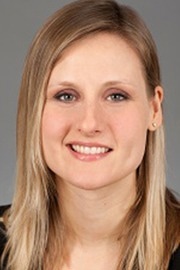Sponsored Content by TecanApr 8 2024
In this interview, Dr. Church, the Molecular and Pediatric Pathologist at Boston Children's Hospital, talks to NewsMedical about their work in pediatric oncology, and the need to expand research and clinical options for children with cancer.
What inspired you to focus your work on pediatric oncology and the need to expand research and clinical options for children with cancer?
I have always been fascinated by biology and genetics, which drove my interest and pursuit of medicine and then pathology. As I moved through my training, I could clearly see the need for improved molecular techniques in pediatric oncology, and of course, it feels very compelling to be able to have a positive impact on a young life. It is such a privilege for me to work to support the care of children with cancer.

Image Credit: PeopleImages.com-Yuri A/Shutterstock.com
Could you share a specific story or accomplishment that stands out in your journey to advance pediatric oncology?
After many years of work developing and starting up our new molecular laboratory at Boston Children’s Hospital, we were able to design and validate a test to detect fusions in pediatric cancers. Soon after launching our test, we had a young boy who presented emergently to our hospital with metastatic tumors. We were able to use our new test to identify a gene fusion that clinched his diagnosis and made him eligible for a matched targeted therapy, and he responded beautifully to that treatment. More details about the case are available here.
In your role at Boston Children's Hospital and Harvard Medical School, what innovative approaches have you introduced to improve the diagnosis and treatment of pediatric cancer?
We are fortunate to work closely with our colleagues in surgical pathology and pediatric oncology, so we’re able to see the needs of our team and our patients. We are focused on developing and implementing tests uniquely designed for children with cancers who have different genetic changes and different medical needs. Some of our tests include droplet digital PCR for children with brain tumors and vascular anomalies, RNA-based NGS assays for fusion detection in childhood cancers, sensitive DNA NGS for patients with vascular anomalies, and cell-free DNA assays for pediatric cancer patients.

Image Credit: Pixel-Shot/Shutterstock.com
The Profile and GAIN consortium studies have been significant in your work. Can you walk us through an example of how the findings from these studies directly impacted a child's diagnosis and treatment?
Both studies enrolled cancer patients to receive molecular tumor profiling to help us understand how these new technologies can help our patients. The results are clear that this approach has a direct, meaningful impact on cancer care for both adult and pediatric patients. In our analysis of the GAIN study, 61% of pediatric cancer patients had genomic alterations with diagnostic significance, and 65% had alterations that inform potential matched targeted therapies.
What are the main challenges you see in pediatric oncology that you are working to address?
Challenges include the rarity of pediatric cancers and the lack of access to matched targeted therapies. Childhood cancers are rare overall but also represent a collection of rare and ultra-rare cancers, making it challenging to put together large datasets. We often look to other, more common cancers to help inform our decisions about how to care for children. Children are often left out of clinical trials for new treatments, which poses another barrier to improved care.
Tell us more about your collaborations with Tecan and how this partnership is shaping the landscape of clinical options for children with cancer.
I am grateful to Tecan for helping to communicate about molecular tumor profiling for children and for advocating for our pediatric cancer patients.
The NCI-funded Count Me In Study is quite significant. What outcomes or advancements are you hoping to achieve through this study, and what implications might it have for pediatric oncology?
Patients are increasingly interested in participating directly in research, particularly related to genetic sequencing, as it is so promising as a transformative technology.
With Count Me In, we have partnered with patients to design every aspect of the study and are returning genetic results directly to our patient participants. We hope to learn more about the genomic landscape of rare cancers (specifically osteosarcoma and leiomyosarcoma).

Image Credit: crystal light/Shutterstock.com
Our patient participants will also help us to understand how better to engage and partner with them and how to write genetic reports that are clear and that meet their needs.
As the Chair of Training & Education for the Association for Molecular Pathology, how are you preparing the next generation of pediatric oncology and molecular pathology experts to meet the field's evolving needs?
I love working with residents and fellows who are our future leaders and experts in molecular diagnostics, both at the Association for Molecular Pathology and as the Program Director for the Harvard fellowship program. Our field is moving so quickly; we are providing the latest information but also helping to create a solid foundation of knowledge and confidence in their skills so that they are able to adapt to the changing needs of our patients over time.
Could you share a success story from your work, illustrating how molecular testing has made a tangible difference in a child's cancer diagnosis and treatment?
I was fortunate to be involved in the care of a child with a large tumor that was unresectable with surgery. We discovered an NTRK fusion as the driver of his cancer, and our team was able to get him access to a new matched targeted therapy. He responded beautifully and was able to walk again.
https://blog.dana-farber.org/insight/2017/06/an-unclassified-tumor-with-a-precisely-targeted-therapy/
What, in your view, is the most promising avenue for future breakthroughs in pediatric oncology, and how does it align with your vision for the field?
Our pediatric pathologists and oncologists have become experts in molecular genetics and how to use those tests to help our patients. New drugs and technologies are coming out quickly – with continued support and collaboration, I expect we will make great strides in the next decade.

Image Credit: CI Photos/Shutterstock.com
In terms of community involvement, what can individuals, organizations, and the broader scientific and medical community do to support your mission of improving clinical options for children with cancer?
Awareness of the unique needs of patients and their families going through childhood cancer is so important. Please keep supporting organizations doing this work and advocating for improved access to molecular testing for children.
Where can readers find more information?
About Dr. Church
Dr. Church is a Molecular and Pediatric Pathologist at Boston Children's Hospital, where she is a founder and associate medical director of the Laboratory for Molecular Pediatric Pathology (LaMPP). She is an Assistant Professor of Pathology at Harvard Medical School and the Program Director for the Harvard Molecular Genetic Pathology Fellowship, and the Chair of Training & Education for the Association for Molecular Pathology.
Her clinical and research work focuses on bringing molecular testing to the clinical care of children with cancer. Through institutional projects (the Profile study, GAIN consortium study), we have profiled thousands of children's tumors and have used these results to make real-time impacts on their diagnoses and treatments. Dr. Church is also involved in national initiatives to improve the quality and access to molecular testing for children with cancer, including the NCI-funded Count Me In Study (Dana Farber, Broad Institute), the National Comprehensive Cancer Network, National Institutes of Health, and the Children's Oncology Group.